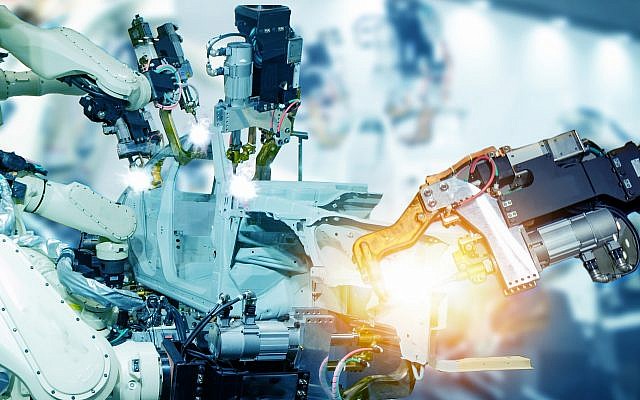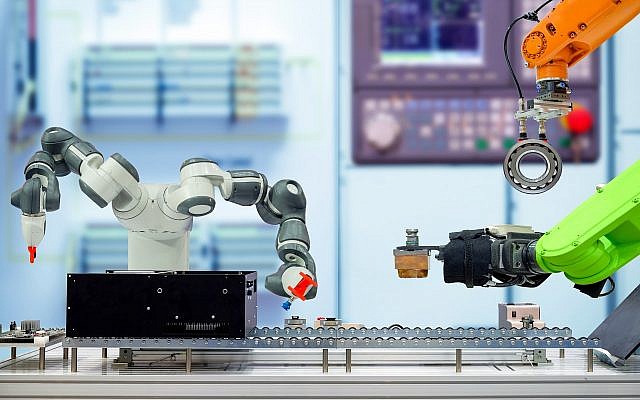Israeli startups to play key role in the fourth industrial revolution
Venture-backed financing for advanced technologies grew 223% in 4 years, placing the Jewish state third globally after the US and China, Start-Up Nation Central says
Shoshanna Solomon was The Times of Israel's Startups and Business reporter

Israel has the potential to become a major player in an increasingly connected world in what is being called the fourth industrial revolution, in which manufacturers are adopting innovative tools and cloud applications in order to stay competitive, according to a new report.
In this development — also known as Industrial Internet of Things (IoT), I4, 4.0 or smart manufacturing — technologies are becoming cheaper, enabling manufacturers to shift their focus from making products in countries with cheap labor to bringing production back home but in a “smarter way.”
“This industry, I4, could be even bigger than auto-tech, as it touches manufacturing everywhere. The potential is endless,” said Guy Hilton, general manager of Start-Up Nation Central, a nonprofit organization that tracks Israel’s tech industry, in a statement released with the publication of its report.
Israel, a country that doesn’t make cars, has become a global powerhouse for auto technologies with multinationals snapping up startups in the field. In 2017, Intel Corp. acquired Mobileye, a maker of self-driving technologies, for a massive $15.3 billion, putting Israel on the map for the sector.

“We’re now poised to repeat that success” in the Industrial IoT field, said Hilton, “if we can help I4 startups overcome their challenges, such as building bridges between Israeli innovation and multinationals, increasing international awareness of the Israeli ecosystem and strengthening the Industry 4.0 community.”
The global market for Industry 4.0 solutions grew to almost $90 billion in annual revenues in 2018 with an expected 20% annual growth over the next five years, the SNC report said.
There are 230 Industry 4.0-related companies — a 60% increase from 2014 — in Israel today, in fields like operations optimization for factories, sensing and imaging, connectivity, robotics, 3D printing, predictive maintenance, inspection and testing, and cybersecurity for connected factories.
Venture-backed financing for Israel’s 4.0 industry grew 223% in four years, to $365 million in 2018 from $113 million in 2014. The 2018 financing figure accounts for 5% of global VC-backed financing for the I4 industry, according to Pitchbook, placing Israel third globally after the US and China.
Total funding in the sector in Israel jumped to $365 million in 2018 from $253 million in 2017, a 44% increase, the report said. And there is still opportunity for growth.

Israeli startups benefit from the presence of some 50 large global firms that have activities related to Industry 4.0. Some of these companies run local R&D centers or corporate venture arms, while others operate innovation hubs, accelerators and government-supported innovation labs, the report said.
According to SNC data, there are 23 R&D centers, 11 hubs and eight accelerators and incubators dealing with 4.0 technologies operating in Israel. In addition, the government has earmarked over $100 million to support the transition of the local manufacturing industry to IoT.
There are steps that should be taken, the report said, including those mentioned by Hilton above, like boosting the ecosystem of startups operating in this field, building bridges with multinationals, and increasing international awareness of Israel’s capabilities.
But there are also other challenges that are global, such as adapting human capital and existing machinery to new technologies; keeping costs of adopting new tech in check and overcoming the fear of hackers and cyberattacks that could occur as more and more things get connected.
In addition, unlike in the auto-tech industry where one solution could be used for a variety of cars, many 4.0 industry solutions will have to be tailored to specific needs of each customer, their machines and employees, as the manufacturing industry is varied by nature. This requires startups in the sector to work closely with clients to adapt their technologies to their individual needs.
This means that the industry will most likely be made up of smaller, niche companies, catering to the specific needs of particular industries.
“We won’t see a Mobileye in I4,” said Yuval Engelstein, Start-Up Nation Central’s Industry 4.0 research analyst and the report’s author. “We’re more likely to see many small, niche exits. It’s a much broader industry, with a product-market fit different for every vertical.”

Added to all of those issues is a lack of local Israel beta testing facilities where startups can try out their technologies.
One way to help these startups is to get more of them running proof-of-concept trials in Israeli factories, Engelstein said. But that won’t be an easy feat, as some 85% of Israel’s 22,000 registered factories are traditional, labor-intensive production facilities that make things like food, pulp and paper, and textiles.
“Very few have the financial ability or leadership vision to take on digital transformation,” the report said.
Still, things could be moving in the right direction. The Israel Innovation Authority is seeking to encourage local factories to make their facilities available as local proof-of-concept sites, and multinationals like Qualcomm Ventures, Siemens Dynamo, GE Ventures and Merck, which already operate in Israel, could lead the way in this regard, the report said.
For the report, Start-Up Nation Central defines the term Industry 4.0 — and the other names by which it is known — as the use of technologies for data collection and analysis to improve production processes, and the introduction and connection of innovative production tools, such as advanced industrial robotics and additive manufacturing (industrial 3D printing), to existing production processes.










